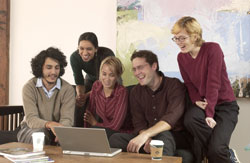 Module One: The Journey Begins
Module One: The Journey Begins
Is there a compelling reason to support diversity in the United States? Do we, as educators, need to be culturally competent? How does our level of cultural competence, or views about towards diversity, impact student success in our classrooms? We begin this transformative journey by asking ourselves whether we believe that diversity is worth supporting.
Our answers to these questions can inform and impact how we interact with students and their families. We also support cultural competence in ourselves and our students when we reflect on and put into practice our answers about diversity in the classroom.
Module Two: Destination: USA
What does it mean to be an American? What is meant by statements such as "Why don't they just act like an American?" Who are the "they" and who are the Americans? Which groups are viewed as the norm, and therefore American? Which groups are viewed as the ones needing to change? Who are the people of this great land known as the United States of America? This module will introduce different perspectives of Americans and examine culture and vocabulary needed to keep the conversation moving.
Module Three: Personal Preparation
As both Gary Howard and Parker Palmer have stated, the work of teaching requires us to start with ourselves. Our life's lessons, opportunities, and experiences have made us into unique beings. We bring all of who we on this journey and into our classrooms, affecting the work we do with students and families. Unexamined, some of the messages we may have been given regarding groups other than our own could potentially influence the expectations we have of our students...before we have even met them. This workshop provides each of us with an opportunity to peer into our deeper self and, as Palmer states, "If I am willing to look into that mirror and not run from what I see, I have a chance to gain self knowledge — and knowing myself is as crucial to good teaching as knowing my students and my subject." With student success as our destination, prepare for take off!
Module Four: On The Road: Race, Culture, & Language
In Module 4, we will begin to look at some of the issues that pull us in different directions, striving to create a common ground of understanding so that culturally responsive teaching can occur, leading to student success! Module 5 continues the journey by taking a closer look at race, culture, and language. How well we understand our position in these socially constructed groups impacts our ability to name the issues and consequently make change.
Module Five: On The Road: Gender, Sexual Orientation, & Religion
As the journey continues, this leg of the trip allows us to make connections between our gender, our sexual orientation, and our religious faith. Are there intersections amongst these memberships that impact our lives in ways that will also impact our work with students? As Parker Palmer says, "teaching is a mirror to our soul." What does your soul tell you about the role of women and men in this society? What have you been taught, and what do you now believe about sexual orientation? Does your faith tell you that your way is the only way of truth? Do these messages you have been given fit with your understanding of the world? How do your beliefs impact the work that your do with students and their families?
Module Six: On The Road: Social Class, Ability, & Age
The topics in this workshop provide us another unique opportunity. We reflect on how our experiences have both shaped our identity and the personal lens through which we see the world as we make three stops on the journey: social class, ability, and age.
Social class encompasses wealth as well as education and personal experiences. Although we may think first about physical disabilities, understanding learning disabilities is also crucial to creating classroom environments where every student can be successful. Ageism can affect our relationships with families and communities.
Module Seven: Crossroads: Rigor, Relationship, and Responsiveness
This module allows us to take a closer look at the benefits of knowing ourselves, our students, and our practice in authentic ways. What does this new knowledge mean to us as culturally competent educators?
Module Eight: The Journey Continues
Paulo Freire presents us with an excellent exiting thought. What will it take for you to respect both your students and yourself? What types of questions must you ask yourself for further self knowledge? In what ways will you be intentional about getting to know the students and families in your classroom? How has your practice been impacted? Do your answers to these questions provide evidence of respect for all involved? As we approach the end of this journey, another one begins—a lifelong journey that will build on our passion for equity and transform our practice to benefit all our students.
 Module Overviews
Module Overviews